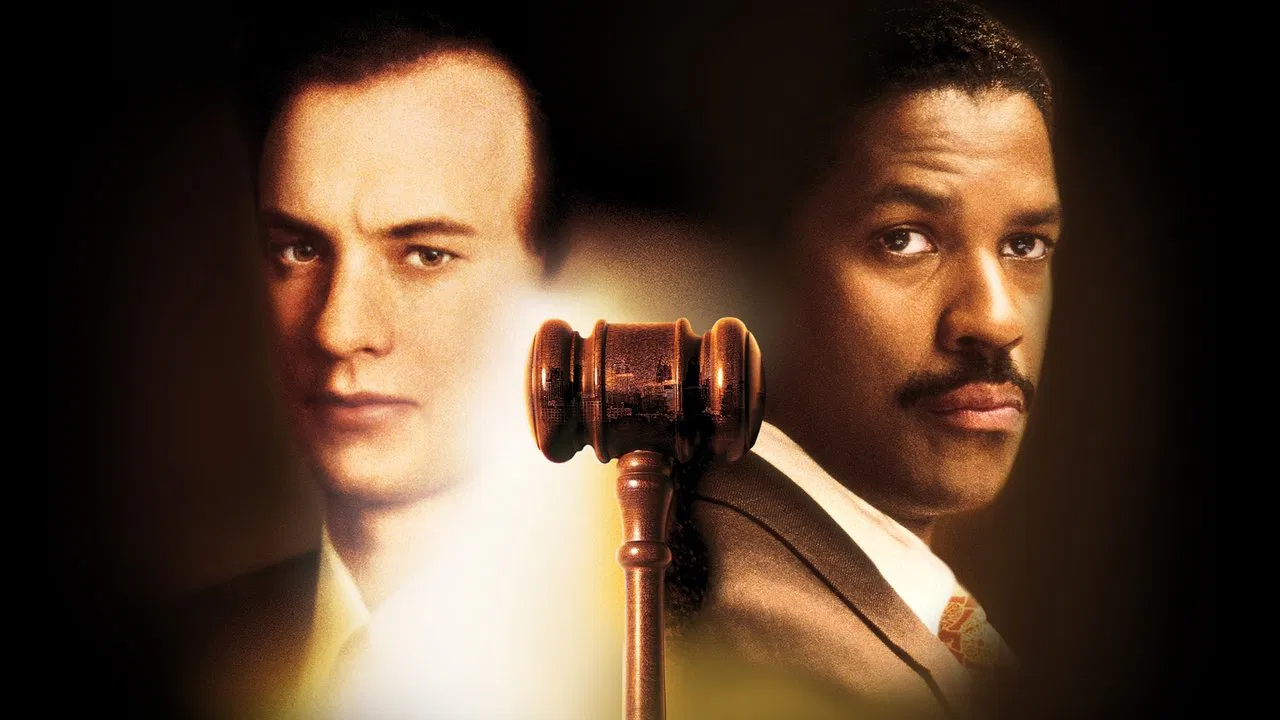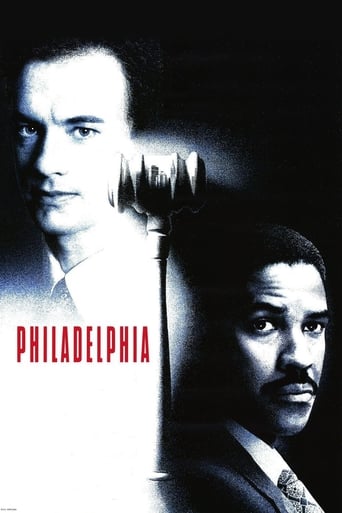

I gave it a 7.5 out of 10
... View MoreIt’s not bad or unwatchable but despite the amplitude of the spectacle, the end result is underwhelming.
... View MoreThe film may be flawed, but its message is not.
... View MoreClose shines in drama with strong language, adult themes.
... View MoreThe more I watch movies that I've only seen once, or not for a long time, the more I'm of the opinion that (for the most part) you can't possibly get a good idea about a movie just by seeing it the one time.My opinion of Philadelphia has changed drastically since the first time I saw it several years ago.The first time I saw it, I liked neither the story, nor the screenplay, and the movie's only redeeming quality (other than the cast), was the theme song which won an Academy Award.Now, however, after seeing it two weeks ago, I'm amazed at what a really great movie this is.The issues it touches on are explosive, and controversial.I never really appreciated what a good job it does of bringing them out, the script having been written objectively, and with a great deal of class, and finesse.Andrew Beckett (Tom Hanks) is one of the best attorneys at the top Philadelphia law firm that employs him.His bosses, in fact, have so much faith in his abilities, that they are about to let him represent the most prestigious client ever to come their way...until one of them sees something on Andrew's forehead which gives away his contraction of AIDS.Suddenly Andrew is fired, after the staged misplacement of a document allows the partners to claim he's incompetent.The excuse is as flimsy as paper, and Andrew (unable to put this outrage behind him) is determined to sue.No lawyer he goes to, however, can see that he has a case, and after his ninth try, Andrew finally finds himself in the office of Joe Miller (Denzel Washington).In the past, Joe and Andrew had been rivals in court, and like other attorneys, Joe does not see that Andrew has a case.He is also putt off by Andrew's sexual orientation, and, more importantly, his illness which makes Joe worry about his newborn baby.But after encountering Andrew in a library, Joe decides to represent him.The two men form a reluctant friendship, as the case drags on, and Andrew's life begins to slip away.All the cast was excellent, Denzel Washington was great, and Tom Hanks, (I must say), really deserved the Oscar. No one could've played the character as well as he did.This is a surprising, outstanding movie, which may warrant a second or even third watching to be appreciated, but it's certainly worth it.Originally, Review #118Posted On: May 20, 2011
... View MoreSeriously, the thing that stood out for me in this film was Andrew Beckett's (Tom Hanks) great family straight out of a Norman Rockwell illustration. His parents are still together after 40 years, he was raised in a large home in a good suburb, he has numerous siblings and numerous nieces and nephews, and all are accepting of his being gay and supportive of his lawsuit when he is apparently sabotaged at work and then fired for incompetence when he believes the law firm partners actually fired him because he had AIDS and was gay.This film was made almost a quarter of a century ago, and I guess to make Beckett sympathetic in those times there had to be nothing negative in his background. Thus the great family, his great intellect and passion for the law, and the solid long term partner in Miguel. His only failing - unprotected sex once in a gay porn theatre while in a relationship with Miguel. Thus the AIDS.There really is no leading lady in this film. Instead, there are two leading men. Andrew Beckett as the plaintiff who cannot find a lawyer to take his case, and Denzel Washington as the attorney who ultimately takes his case, although he is initially scared of Andy, scared of AIDS, repulsed by the idea of gay people. Washington as attorney Joe Miller is portrayed as a devoted family man and flamboyant personal injury lawyer who thinks no plaintiff is too stupid to defend - numerous warning signs, plaintiff ignores them, plaintiff falls into manhole, for example. Yet he will not take Andy's case, initially. It's only after he sees a connection as to how he is treated at the public library for being African American and how Andy is treated there for being obviously ill of AIDS does he change his mind.Where the great acting lies is in the growing friendship between Andy and Joe as they work on the case together. It is a subtle gradual shift in Joe's outlook until at the end, he buys a bottle of Dom Perignon to give to Andy in the hospital when, due to the price, he would not buy a bottle of that same champagne to celebrate the birth of his own child at the beginning of the film.Honorable mention to Jason Robards as the chief partner of the law firm being sued who is more upset about the indignity of being hauled before the Philadelphia legal establishment as a civil defendant than he is about any possible loss of money, and to Joanne Woodward as Andy's mom who keeps a stiff upper lip in front of her son, yet the fact that he is dying in front of her is tearing her up. Sorry Mary Steenburgen, you are a great actress, but you just don't have me believing that you "hate gays", but you do have me believing you are a great attorney.Today, lots of the characterizations may leave you feeling like you were hit over the head with a sledge hammer by Captain Obvious, but remember the time frame. People still had preconceived notions about homosexuals as in they must be deviant or have had something in their past that made them "that way", and they were definitely scared of AIDS and still not sure it was that hard to contract. Stick around for the great acting by Washington and Hanks and a host of supporting players. And also stick around for the final scene. It will jerk at your heartstrings.
... View MoreOver the last few years, I have been churning my way through the films of Denzel Washington. I love the intensity and passion he brings to his roles, plus the fact that, "Manchurian Candidate" aside, he hasn't really been in any bad films. For whatever reason, I had not yet seen "Philadelphia", which is hailed by film critics and garnered Tom Hanks a Best Actor academy award in 1992. After viewing, I found it to be not as epic as some would have me believe, but still an interesting two hours nonetheless.The basic plot of the film is the story of two lawyers (Denzel and Hanks). Hanks' character contracts AIDS and enlists the help of "Washington" to help him file a discrimination lawsuit against the company that fired him (supposedly due to the disease). Along the way, the plot actually morphs to become more of a "panel discussion" on the treatment/perception of gay people in the United States.In dealing with such a sensitive topic, the film is able to lay out its message without sounding too crass or too offensive to either side. Basically, director Jonathan Demme knows that viewers will obviously have pre-determined attitudes about the issue before viewing the film, and thus doesn't try to sway any perceptions. Instead, through the legal, court-room setting, he just invites both sides to think about the issues at hand and consider possible scenarios. I liken it to a more recent Denzel Washington film entitled "The Great Debaters", which discussed the issue of the Jim Crow south through a high school debate team. Some pretty meaty issues were thrown around, but under the guise of "debate" the viewers don't really feel any compulsion to take a side, instead just being privy to the information. A similar factor is what I believe is the true brilliance of Demme's film...he treats the viewers like a jury and allows us to come to our own conclusion about the issues he is discussing.Thus, unless you have incredibly strong feelings one way or the other about the issue of gay rights (then the film is bound to upset in its generalization of the topic), I would recommend this film to pretty much anyone. While it may not live up to critical hype (likely due to the fact that critics are usually bonkers over artsy or heavy-themed films), it will give you some things to think about.
... View MoreEverything is good and Andy (Tom) is a well respected and a great attorney but his life choose to take him on different path. As he falls from his highest point to the lowest he goes through many different things, both emotional and physical. Joe (Denzel) is attorney that is going to help him fight for his rights and prove that every man is equal and deserves a fair treating. It's incredible how powerful human beings are and same goes for Joe that in first was repelled by Andy and after seeing how he is ready to fight for himself, he decided to help him. Nerves and will that Andy put into this case were humongous and he brings every little emotion to screen and puts quite a experience for everyone watching. It shows how people are treated as not equal and that there are so much judgment in a lot of humans. Some of the scene were a little choppy and maybe tried to be bring some feeling but didn't quiet succeeded. Magnificent and moving performance by Tom Hanks which just left mouths shut and projected so much emotions, pain and fight for right things. Denzel also puts up a great performance and shows how humans are great and willing to fight for another. Musical piece that played is also very refreshing and amazing. 3.5/4
... View More